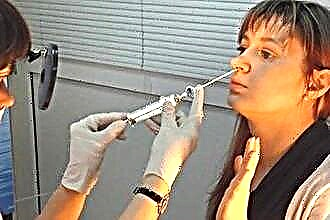Hypersecretion of mucus is a pathological symptom indicating the development of disorders in the respiratory system. The accumulation of viscous secretion in the pharynx may be associated with the negative influence of exogenous and endogenous factors.
In the presence of pathological processes in the airways, the volume of secreted sputum can increase several times.
The mechanism of development of pathology
 Why does mucus accumulate in my throat? Septic inflammation is one of the key causes of hypersecretion and accumulation of phlegm in the airways. In the absence of pathological processes, the volume of tracheobronchial mucus separated per day does not exceed 100 ml. Catarrhal inflammation in the ENT organs stimulates the production of secretions with bactericidal properties, as a result of which the volume of sputum can increase to ½ l.
Why does mucus accumulate in my throat? Septic inflammation is one of the key causes of hypersecretion and accumulation of phlegm in the airways. In the absence of pathological processes, the volume of tracheobronchial mucus separated per day does not exceed 100 ml. Catarrhal inflammation in the ENT organs stimulates the production of secretions with bactericidal properties, as a result of which the volume of sputum can increase to ½ l.
Colorless mucus is produced by goblet cells, which are located in the ciliated epithelium. It prevents drying out of the mucous membranes and the penetration of pathogenic agents into the tissues. Sputum is produced not only by the tracheobronchial tree, but also by the nasopharynx. An increase in its volume is associated with the development of infections, exposure to allergens and the penetration of foreign bodies into the respiratory system.
Sputum hypersecretion is the body's natural response to the influence of pathological exogenous and endogenous factors.
Provoking factors
What should you do if mucus collects in your throat? The reasons for the increased activity of ciliated epithelial cells lie in the development of infectious and non-infectious pathologies. It is possible to determine the optimal treatment regimen for diseases only after undergoing differential diagnosis and diagnosis.
The main factors provoking the accumulation of viscous secretions in the airways include:
- allergens - irritate the mucous membrane of the nasopharynx, as a result of which an excess amount of mucus begins to be produced in the nasopharynx;
- neoplasms - stimulate the secretory activity of goblet cells, which subsequently leads to an increase in the volume of sputum in the throat;
- microorganisms - disrupt the functional activity of the ciliated epithelium and stimulate the production of sputum by the tracheobronchial tree;
- pathology of the gastrointestinal tract - the duodenal contents of the stomach, penetrating into the upper esophagus, irritate the ciliated epithelium, which stimulates the activity of the goblet cells.
Why does phlegm constantly collect in the throat? The reasons for the hyperactivity of the mucous membranes of the ENT organs are often caused by the negative effects of tobacco smog, chemical reagents, dusty or dry air. All these factors have a destructive effect on the state of the tissues of the respiratory tract, which stimulates the production of mucus in large volumes.
The nature of the sputum

Mucous discharge is odorless, however, in the case of the development of septic inflammation, the occurrence of a putrid odor is not excluded. Constant phlegm in the throat is not a separate pathology, but only a symptom indicating the development of certain diseases. You can determine the type of pathology by the color and consistency of mucus, which is expectorated when coughing:
- mucous - transparent, odorless sputum of moderate density, which occurs against the background of the development of pathologies of the respiratory tract;
- serous - colorless, liquid and frothy mucus that appears with obstruction of the lungs;
- mucopurulent - fetid sputum of a yellow or green hue, resulting from the development of tuberculosis, pneumonia, chronic bronchitis, etc.;
- purulent - mucus of a semi-liquid consistency with an unpleasant odor, which is most often formed with purulent bronchitis, abscess of ENT organs, gangrene of the lungs, etc.
Important! Some ENT diseases can proceed in an atypical form, therefore, it is impossible to find out the type of pathology only by consistency and concomitant clinical manifestations.
It should be understood that the exact cause of mucus in the throat can only be determined by a competent specialist after visual and instrumental examination of the patient. It is possible to judge the development of septic or aseptic inflammation in the respiratory organs only by the results of bacterial culture and local manifestations of the disease.
Infectious causes

Why does phlegm form in the throat? The causes of hypersecretion of mucus in the pharynx are most often associated with the development of septic inflammation. Disease-causing fungi, viruses and microbes that enter the body cause inflammation in the nasal cavity, throat, bronchi, trachea, etc. To eliminate pathological reactions in tissues, goblet cells begin to function in an enhanced mode, which leads to the accumulation of viscous secretions in the airways.
As a rule, the sensation of a mucous lump in the pharynx occurs against the background of the development of such pathologies as:
- sinusitis - catarrhal or purulent inflammation of the paranasal sinuses, accompanied by profuse mucus from the nasal passages;
- tonsillitis–Septic inflammation of the tissues of the pharyngeal ring, in which the tonsils, pharynx and posterior pharyngeal wall are most often affected; depending on the form of the disease, when expectoration from the ENT organs, transparent or greenish sputum is evacuated, which indicates the development of bacterial inflammation;
- adenoiditis–Growth and inflammation of the nasopharyngeal tonsil, an increase in the volume of which prevents the normal expectoration of mucus that forms on the walls of the airways;
- bronchitis–Viral or bacterial inflammation of the tissues of the bronchial tree, which leads to impaired drainage function of the lungs and, accordingly, the accumulation of pathological secretions in the pharynx;
- tracheitis–Catarrhal or purulent inflammation of the trachea, characterized by hyperactivity of the goblet cells of the mucous epithelium, as a result of which viscous mucus begins to collect in the ENT organs;
- pneumonia - Infectious lesion of the lung tissue with predominant inflammation of the alveoli, which leads to exudation;
- nasopharyngitis - catarrhal inflammation of the mucous epithelium of the nasopharynx and throat, accompanied by the formation of an excess amount of exudate in the respiratory organs;
- pharyngitis - an infectious lesion of the lymphoid tissues of the pharynx and mucous membranes of the throat, in which a moderate amount of sputum begins to accumulate in the respiratory tract.
Pathologies of the broncho-pulmonary system are treated mainly in a hospital setting, since many of them lead to the development of formidable complications.
Before prescribing medications, the specialist must conduct a comprehensive examination of sputum, bronchoscopy, radiography, etc. Therapy involves the use of an integrated approach that ensures not only the elimination of inflammatory reactions in the respiratory organs, but also the normalization of the drainage function of the bronchi.
Non-infectious causes
Why does mucus collect in my throat? It should be understood that active sputum secretion is a protective reaction that occurs as a result of septic or aseptic inflammation of the mucous epithelium. Extrapulmonary pathologies and allergic reactions to exogenous stimuli can provoke sputum hypersecretion.
Excessive mucus formation in the ENT organs is often associated with:
- allergic rhinitis - catarrhal inflammation of the nasopharyngeal mucosa, which is associated with an allergic reaction of tissues to the influence of allergens (dust, animal hair, pollen); the pathological secret accumulated in the nasopharynx flows down the back of the throat, which causes a severe cough and lacrimation;
- injuries of the mucous membranes - mechanical and chemical injuries lead to damage to the ciliated epithelium, resulting in inflammation and, accordingly, excessive sputum formation in the respiratory organs;
- gastroesophageal reflex - Throwing gastric juice into the upper esophagus leads to a burn on the walls of the pharynx, which inevitably leads to increased secretion of viscous mucus;
- eating spicy food - hot and spicy food irritates the mucous membrane of the oropharynx, which stimulates an increase in the amount of pathological secretions in the ENT organs;
- smoking - the systematic effect of tobacco smog on the respiratory tract leads to tissue atrophy and disruption of the mucus secretion process by goblet cells.
Coughing up a viscous secretion streaked with blood may indicate the development of pulmonary embolism, which leads to cardiac arrest.
Delayed treatment of pathologies threatens the patient with serious systemic complications and even death. Therefore, when the first signs of pathology are found, it is necessary to be examined by a specialist. It should be noted that goblet cell hyperactivity may be associated with the development of benign and malignant tumors. Inadequate treatment of cancer often leads to pharyngeal stenosis and suffocation.
When to see a doctor?
A feeling of a lump in the throat, difficulty swallowing and wheezing in the respiratory system most often indicates the presence of an excess amount of viscous secretion in the throat. Symptoms may worsen in the morning or immediately after a meal. It is undesirable to postpone a visit to a specialist if the following pathological signs are found:
- sore throat and burning sensation;
- runoff of sputum along the walls of the pharynx;
- cough with expectoration of viscous secretion;
- inability to swallow or cough up mucus;
- fetid odor from the mouth;
- the formation of an excess amount of mucus in the nose.
If the hyperactivity of the ciliated epithelium is due to septic inflammation of the ENT organs, hyperthermia, fever, malaise, nausea, myalgia, etc. will join the symptoms of pathology. When a similar clinical picture appears, it is worth seeking help from a doctor. Only in this case, the patient can be prescribed the necessary drugs of symptomatic and pathogenetic action.



